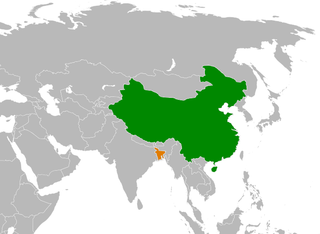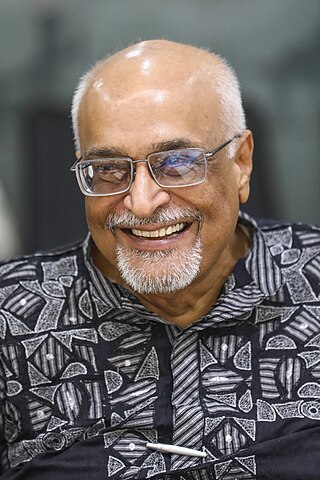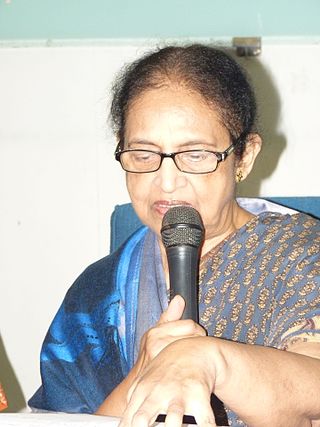Related Research Articles

Bangladesh, officially the People's Republic of Bangladesh, is a country in South Asia. It is the eighth-most populous country in the world and is among the most densely populated countries with a population of nearly 170 million in an area of 148,460 square kilometres (57,320 sq mi). Bangladesh shares land borders with India to the north, west, and east, and Myanmar to the southeast. To the south, it has a coastline along the Bay of Bengal. It is narrowly separated from Bhutan and Nepal by the Siliguri Corridor, and from China by the mountainous Indian state of Sikkim in the north. Dhaka, the capital and largest city, is the nation's political, financial, and cultural centre. Chittagong, the second-largest city, is the busiest port on the Bay of Bengal. Khulna, Rajshahi and Sylhet are other major cities. The official language of Bangladesh is Bengali.

Dhaka, formerly known as Dacca, is the capital and largest city of Bangladesh. It is the ninth-largest and seventh-most densely populated city in the world. Dhaka is a megacity, and has a population of 10.2 million residents as of 2022, and a population of over 22.4 million residents in Dhaka Metropolitan Area. It is widely considered to be the most densely populated built-up urban area in the world. Dhaka is the most important cultural, economic, and scientific hub of Eastern South Asia, as well as a major Muslim-majority city. Dhaka ranks third in South Asia and 39th in the world in terms of GDP. Lying on the Ganges Delta, it is bounded by the Buriganga, Turag, Dhaleshwari and Shitalakshya rivers. Dhaka is also the largest Bengali-speaking city in the world.

The economy of Bangladesh is a major developing market economy. As the second-largest economy in South Asia, Bangladesh's economy is the 33rd largest in the world in nominal terms, and 25th largest by purchasing power parity. Bangladesh is seen by various financial institutions as one of the Next Eleven. It has been transitioning from being a frontier market into an emerging market. Bangladesh is a member of the South Asian Free Trade Area and the World Trade Organization. In fiscal year 2021–2022, Bangladesh registered a GDP growth rate of 7.2% after the global pandemic. Bangladesh is one of the fastest growing economies in the world.

The foreign relations share the Bangladeshi government's policies in its external relations with the international community. The country pursues a moderate foreign policy that places heavy reliance on multinational diplomacy, especially at the United Nations and World Trade Organization (WTO). Since independence in 1971, the country has stressed its principle of "Friendship towards all, malice towards none" in dictating its diplomacy. As a member of the Non-Aligned Movement, Bangladesh has tended to not take sides with major powers. Since the end of the Cold War, the country has pursued better relations with regional neighbours.

The least developed countries (LDCs) are developing countries listed by the United Nations that exhibit the lowest indicators of socioeconomic development. The concept of LDCs originated in the late 1960s and the first group of LDCs was listed by the UN in its resolution 2768 (XXVI) on 18 November 1971.

Rehman Sobhan is a Bangladeshi economist. Regarded as one of the country's top public thinkers, he is the founder of the Centre for Policy Dialogue. Sobhan is an icon of the Bangladeshi independence movement due to his role as a spokesman of the Provisional Government of Bangladesh in the United States during the Bangladesh Liberation War. He was awarded the Independence Day Award, Bangladesh's highest civilian honour, in 2008.

The Centre for Policy Dialogue (CPD), established in 1993 by Rehman Sobhan, its Founder chairman, with support from leading civil society institutions in Bangladesh, is mandated by its Deed of Trust to service the growing demand originating from the emerging civil society of Bangladesh for a more participatory and accountable development process. CPD seeks to address this felt-need from the perspectives of marginalised stakeholders, by way of organising multistakeholder consultations, by conducting research on issues of critical national, regional and global interests, through dissemination of knowledge and information on key developmental issues, and by influencing the concerned policy making processes.

Bangladesh–China relations are the bilateral relations of Bangladesh and China. Bangladesh has an embassy in Beijing and consulates in Hong Kong and Kunming. China has an embassy in Dhaka. Both countries are members of the BCIM Forum. According to Chinese government designations, Bangladesh and China are in a "strategic partnership of cooperation".
Masihur Rahman is an economist and a former civil servant of the Bangladesh government. During his career, he held many important government offices and represented the government at the World Bank, the Asian Development Bank, the International Fund for Agricultural Development, and the Islamic Development Bank.
Swadesh Ranjan Bose was a Bengali language movement activist and an economist. For his contributions to the field of economics he was posthumously given the Independence Day Award, Bangladesh's highest state award.

Saman Kelegama was a Sri Lankan economist, author and the executive director of the Institute of Policy Studies (IPS).

The Bangladesh, China, India and Myanmar Economic Corridor (BCIM) was a proposed corridor connecting India and China through Myanmar and Bangladesh as a corridor.

The 'Fazli' mango is a mango cultivar primarily grown in Bangladesh and Indian state of West Bengal. It is a late maturing fruit, available after other varieties. Fazlis are commonly used in jams and pickles in the cuisine of the Indian subcontinent. Each mango can be quite large, going up to a kilo. Rajshahi Division in Bangladesh is the major producers of fazli. An important commercial variety, it is increasingly being exported.

Debapriya Bhattacharya is an economist and public policy analyst from Bangladesh. He was the first executive director of Centre for Policy Dialogue in Dhaka. He also worked as a senior research fellow at Bangladesh Institute of Development Studies (BIDS).
Feminism in Bangladesh seeks equal rights of women in Bangladesh through social and political change. Article 28 of Bangladesh constitution states that "Women shall have equal rights with men in all spheres of the State and of public life".

Najma Chowdhury was a Bangladeshi academic.

Dhaka Custom House is a Bangladesh government regulatory agency under the Ministry of Finance responsible for enforcing tariffs and customs on shipments in Dhaka. It is the largest airport customs house in Bangladesh. Md. Mosharraf Hossain Bhuiyan is in charge of Dhaka Custom House.

The Old Dhakaites are an Indo-Aryan cultural group viewed as the original inhabitants of Dhaka. They are sometimes referred to as simply Dhakaites or Dhakaiya. Their history dates back to the Mughal period with the migration of Bengali cultivators and merchants to the city. The cultivators came to be known as Kutti and they speak Dhakaiya Kutti, a dialect of Bengali and the merchants came to be known as Khoshbas and speak Dhakaiya Urdu. There are sizeable populations in other parts of Bangladesh. The Old Dhakaiyas maintain a distinct regional identity in addition to their ethnic Bengali identity, due to cultural, geographical and historical reasons. They have been described as a wealthy but very closed-off community; evidently being a minority in their own hometown. It is said that some people living in Greater Dhaka are even unaware of the existence of an Urdu-speaking non-Bihari minority community although their presence dates back centuries.
Sharifa Khan is a Bangladeshi civil bureaucrat and the second female secretary at Economic Relations Division, Ministry of finance Bangladesh since 17 July 2022. Prior to the current position, she was a member of the Agriculture, Water Resources and Rural Institute Division of the Bangladesh Planning Commission.
Shahdeen Malik is a Bangladeshi lawyer, eminent jurist, a constitutional expert, and legal activist.
References
- 1 2 3 4 5 "Dr Fahmida Khatun". Centre for Policy Dialogue. Archived from the original on 26 June 2016. Retrieved 18 August 2016.
- ↑ Sachs, Jeffrey D.; Modi, Vijay; Figueroa, Hernan; Fantacchiotti, Mariela Machado; Sanyal, Kayhan; Khatun, Fahmida; Shah, Aditi. "How Information and Communications Technology Can Achieve The Sustainable Development Goals" (PDF). Ericsson. Archived from the original (PDF) on 23 November 2015.
- ↑ "A purist Tagore singer". The Daily Star. 10 October 2007. Retrieved 18 August 2016.
- ↑ "Women still sidelined in economic policy". The Daily Star. 23 February 2014. Retrieved 18 August 2016.